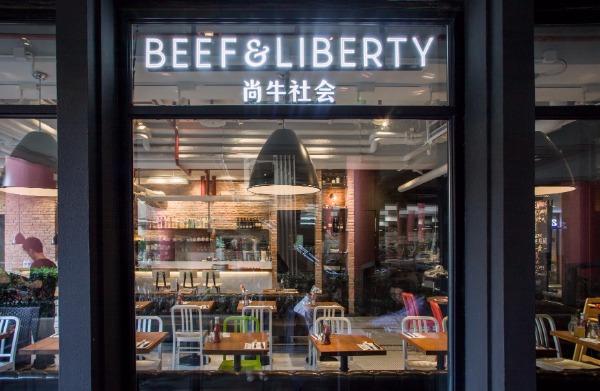Buns, beef, stars and stripes


Localization is important to the company, but those who love what Shake Shack serves can expect the brand's burgers to stay true to their original taste. "We try to localize as much as we can," said Shake Shack's culinary director, Mark Rosati.
"For example, the beef we use is being ground here in Shanghai. Some of our sauces and our custard are also made locally. However, the most important thing for us is still to bring New York City as it is. As we start to open more outlets, we will then add more local touches to the menu."
Chinese customers can look forward to several offerings that are exclusive to the Shanghai outlet. Among these items are straw-bei li cheesecake, a dessert made in collaboration with Shanghai-based Al's Baking Co, and the strawberry yu (zu) garden shake, a beverage made using matcha cream cheese foam that pays homage to the city's Yu Garden.
While Rosati says he may incorporate Chinese elements into Shake Shack's offerings, these inclusions are likely to take a subtle form. One local flavor that has already excited Rosati's taste buds is black vinegar, which is typically used in Chinese cooking.
"I would never create a xiaolongbao burger," Rosati says. "That's just not what we do. But what I do love is black vinegar. There's this richness to the vinegar and I can't get enough of it. I could turn that into a sauce or make something else out of it. I can use that great flavor to create more depth in our offerings."
Acknowledging that food delivery is very much part of consumer culture in China, Garutti noted that the brand will eventually make its burgers available for delivery.
"Right now we just want to take our time and make sure we are focused on getting things right in this first location." Shake Shack's entree into the Chinese market comes on the heels of other popular US burger chains such as White Castle and The Habit Burger Grill, which set up outposts in Shanghai in 2017.
White Castle, known as the first fast food hamburger restaurant in the US, opened its first Shanghai outpost in July 2017. Jason Poon, general manager of White Castle China, says sales have grown gradually. White Castle opened its second outlet in Changning district in mid-2017, and plans are underway to open a third location in the city this year.
One of the reasons for the growth of the brand is a keen focus on localization that includes being social media savvy and delivery-friendly, Poon says.




































